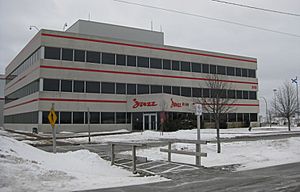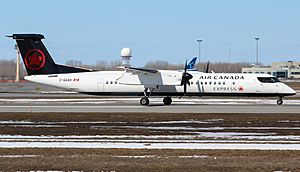Jazz Aviation facts for kids

Jazz Bombardier CRJ900 on final for runway 25, Ottawa Airport
|
|
| Founded | 2001 (amalgamation; as Air Canada Regional) |
|---|---|
| AOC # | Canada: 5002 United States: NZAF100F |
| Operating bases |
|
| Frequent-flyer program | Aeroplan (Air Canada) |
| Alliance | Star Alliance (affiliate) |
| Fleet size | 114 |
| Destinations | 71 |
| Parent company | Chorus Aviation |
| Headquarters | Halifax Stanfield International Airport, Enfield, Nova Scotia, Canada |
| Key people | Randolph de Gooyer (president) |
| Employees | 4,500 |
Jazz Aviation LP, often called Jazz, is a Canadian airline. It is based at Halifax Stanfield International Airport in Enfield, Nova Scotia. Jazz is part of a larger company called Chorus Aviation.
Jazz Aviation offers flights for passengers and special charter services. Most of its flights are for Air Canada under the name Air Canada Express. Jazz also operates flights as Jazz Charters. It is one of Canada's largest airlines by the number of planes it has. Jazz Aviation flies to 79 places in Canada and the United States for Air Canada Express. Air Canada decides where Jazz flies and when.
Before April 2011, Air Canada's regional flights were known as Air Canada Jazz. Later, the Air Canada Express brand was created for all regional flights. Now, the Jazz brand is fully managed by Jazz Aviation LP.
Contents
History of Jazz Aviation
How Jazz Aviation Started
Air Canada Regional Inc. was formed in 2001. It brought together several smaller airlines. These included Air BC, Air Nova, Air Ontario, and Canadian Regional Airlines. This happened after Canadian Airlines joined with Air Canada. The new company was officially created in 2002. It was given a new name: Air Canada Jazz.
In 2006, ACE Aviation Holdings, which owned Air Canada, sold its shares in Air Canada Jazz. Air Canada Jazz then became an independent company. It was known as Jazz Air Income Fund. This company started selling shares to the public in February 2006.
On November 15, 2010, the airline changed its structure. It became a public company called Chorus Aviation. Its shares are traded on the Toronto Stock Exchange.
In 2011, Air Canada announced a change. It would stop using the "Air Canada Jazz" name and plane designs. Instead, its regional flights would be called "Air Canada Express." The planes would say "operated by Jazz" on them.
Important Events in Jazz Aviation's Operations
In February 2006, Jazz Aviation stopped flying from Billy Bishop Toronto City Airport. This was because they could not find terminal space there. Another company bought the terminal space.
In August 2008, Jazz Aviation made a change to save fuel. They removed life jackets from their planes. Instead, passengers are told to use floating seat cushions if there is an emergency over water. The airline explained that they always fly close to land. This means they are not required by law to carry life jackets. They stay within 50 nautical miles (about 93 kilometers) of land.
Other Projects Jazz Aviation Has Done
Working with Thomas Cook Canada
In April 2010, Jazz Aviation made a deal with Thomas Cook Group. Jazz would operate at least six Boeing 757-200 planes. These planes were used during the winter travel season. This deal happened after another Canadian airline, Skyservice Airlines, stopped operating. Skyservice used to fly for Thomas Cook.
The Boeing 757 planes were rented from Thomas Cook Airlines in Britain. They flew to sunny places in the Caribbean, Mexico, and Central America. The deal was extended until 2015.
Sunquest charter flights operated by Jazz Aviation for Thomas Cook Canada began on November 5, 2010. However, on April 13, 2012, Thomas Cook Canada ended the agreement early. The service stopped on April 30, 2012.
For the 2011-2012 winter season, flights left from Canadian airports. These included Toronto, Halifax, Calgary, and Vancouver. They flew to places like Aruba, Nassau, Puerto Plata, Punta Cana, Montego Bay, Cancún, Cozumel, Puerto Vallarta, Los Cabos, and Curaçao.
Investment in PLUNA Airlines
In April 2010, Jazz Aviation bought a part of a company called Latin American Regional Aviation Holding Corporation (LARAH). LARAH owned 75% of PLUNA. PLUNA was the main airline of Uruguay. The government of Uruguay owned the other 25%. On July 6, 2012, PLUNA announced it was stopping all flights. Most of its staff were put on unemployment pay.
Where Jazz Aviation Flies
Jazz Aviation flies to 71 different places. These destinations are located across Canada and the United States.
Jazz Aviation's Fleet (Planes)
The Jazz Aviation fleet includes several types of planes. Here are the planes listed with Transport Canada as of January 2025:
| Aircraft | In fleet | Passengers | Notes | |||
|---|---|---|---|---|---|---|
| J | Y | Total | ||||
| Bombardier CRJ100 | 15 | – | 50 | 50 | These planes are listed as CL-600-2B19 (Series 100) by Transport Canada. | |
| Bombardier CRJ900 | 35 | 12 | 64 | 76 | These planes are listed as CL-600-2D24 (Series 900) by Transport Canada. | |
| De Havilland Canada DHC-8 Q400 | 39 | – | 78 | 78 | These planes are listed as Dehavilland DHC-8-402 by Transport Canada. | |
| Embraer 175 | 25 | 12 | 64 | 76 | These planes are listed as ERJ 170-200 SU by Transport Canada. | |
| Total | 114 | |||||
Bombardier Aviation delivered the first new regional jet, a 75-passenger Bombardier CRJ705, to Jazz Aviation on May 27, 2005. This plane was part of a larger order placed in September 2004. The first flight for passengers was on June 1, 2005, from Calgary to Houston.
On February 9, 2010, Jazz Aviation announced a deal with Bombardier. They would get 15 new Q400 NextGen turboprop planes. These planes started arriving in May 2011. They were designed to carry 74 passengers in an all-economy layout. The Q400s replaced older CRJ100/200 planes. These Q400s were the first Jazz planes to have the new Air Canada Express branding.
On April 26, 2016, Jazz Aviation announced that its remaining CRJ705 planes would be changed into CRJ900s.
On January 14, 2019, Chorus Aviation, Jazz Aviation's parent company, extended its agreement with Air Canada until 2035. As part of this, 14 more CRJ900 planes were added to the fleet.
In 2021, Air Canada Express decided that Jazz would operate all its regional flights. A fleet of Embraer 175 regional jets was moved to Jazz from another airline.
Planes Jazz Aviation Used to Fly
| Aircraft | In fleet | Notes |
|---|---|---|
| Boeing 757 | 6 | Jazz operated these planes for Thomas Cook Canada during winter seasons from 2010 to 2013. |
| Bombardier CRJ100 | 25 | Jazz operated the CRJ100 series from 2004 to 2013. The CRJ200 variant was used until June 2024. |
| British Aerospace 146 | Jazz used to operate these planes, which were inherited from other airlines. They were retired in 2005. | |
| De Havilland Canada Dash 8 | 28 | Jazz operated 28 Series 300 turboprops until January 9, 2022. They also operated 40 Series 100 turboprops until May 6, 2020. |
| Fokker F28 | 30 | Jazz operated these jet planes under earlier airline names. |
Cabins on Jazz Aviation Planes
Business Class Seating
Business Class is Air Canada's premium seating in North America. Jazz offers this on its CRJ-900 and E175 planes. There are 12 leather seats. Each seat has a power outlet and a personal entertainment system. This system offers movies and music. However, the newest 14 CRJ-900s do not have these entertainment screens.
Economy Class Seating
Jazz's Dash 8-400 and CRJ-200 planes have only Economy Class seats. The Dash 8-400s have a modern interior design.
The Economy Class seats on most Jazz planes are comfortable. Some CRJ-900 planes have personal entertainment screens. Some seats also have power outlets. Seats are arranged with two seats on each side of the aisle.
In May 2024, Jazz and Expliseat announced a plan. They will update 25 Dash 8-400s with new, lighter seats.
Services on Board
All Jazz flights for Air Canada offer free hot and cold drinks. They also provide sweet or savory snacks. Alcoholic drinks can be bought.
On flights longer than 90 minutes, Jazz offers a "buy on board" service. This is called Air Canada Bistro. Passengers can buy snacks. On flights three hours and fifteen minutes or longer, sandwiches are also available for purchase. Only major credit cards are accepted for payment.
Flight Incidents
- On May 20, 2007, Jazz Aviation flight 8911 had an incident. The plane's landing gear collapsed after a hard landing at Toronto Pearson International Airport. No one was hurt. The plane was too damaged to be used again.
- On November 6, 2014, Air Canada Express Flight 8481 had a tire blow out during takeoff. The plane had to land in Edmonton. During landing, the right landing gear failed. A propeller blade broke off and hit the plane. Four passengers had minor injuries and were taken to the hospital.
- On February 24, 2015, Jazz Aviation flight 7795 hit a runway light. This happened during landing in bad weather at Sault Ste. Marie Airport. The plane was badly damaged, but no one was injured.
- On May 9, 2019, Jazz Aviation Flight 8615 returned to Toronto due to bad weather. While taxiing, the plane was hit by a fuel truck. The left side of the plane was heavily damaged. Five people were reported injured and received medical care.
Images for kids
-
Boeing 757 In Thomas Cook Canada Livery
See also
 In Spanish: Air Canada Jazz para niños
In Spanish: Air Canada Jazz para niños
 | Delilah Pierce |
 | Gordon Parks |
 | Augusta Savage |
 | Charles Ethan Porter |








